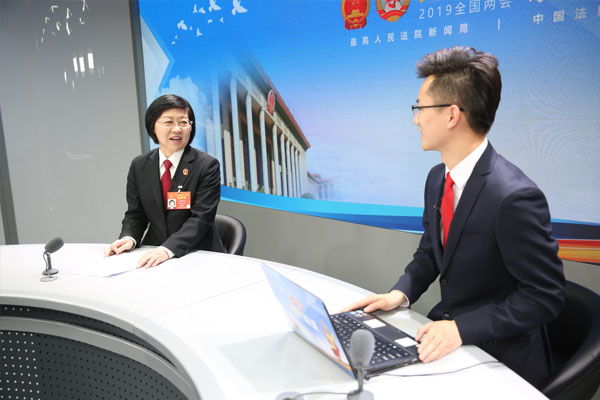Chongqing enforces court orders with joint action mechanism
The top court of Chongqing municipality has established a cooperation mechanism with other sectors to jointly monitor the individual information and properties of debt defaulters and highly restrict their daily life consumption, said a top official of the southwestern Chinese city's high court.
"Those who owe money and are subject to enforcement of court orders will be restricted everywhere they go," said Yang Linping, president of Chongqing Higher People’s Court at the “Justices’ Talks”, a program hosted by the information bureau of the Supreme People’s Court(SPC) and chinacourt.org in March.
Under the joint action of 55 governmental departments including the Chongqing Development and Reform Commission, defaulters' personal information covering a wide area of market supervision, land resources, civil administration, social security, public utilities, banking accounts, financial products and vehicles, was all made public, according to Yang.
The SPC has taken various measures to fight against defaulters, such as adding their names and identity card numbers to a publicly accessible online blacklist which restricts their consumption of goods and services in a large-scale campaign to enforce court orders more efficiently in the past three years.
Some defaulters were punished by barring them from buying airline or high-speed train tickets until their debts are settled, the SPC said in its annual work report at this year's two sessions.
Thanks to the united mechanism, all levels of courts in Chongqing have undertaken 680,000 cases and closed 640,000 cases, settling debt of 118.8 billion yuan ($17.7 billion) by the end of 2018. Around the time of the 2019 Spring Festival Chongqing's courts wound up 1,682 cases related to people's livelihood and 120 million yuan was repaid.
To resolve difficulties in enforcing court orders, the Chongqing top court has also socialized their enforcement power by authorizing agents to investigate properties, entrusting social institutions to help with judicial sales, and inviting professional notaries and social associations to jointly enforce court rulings, according to Yang.
As an upstream city, Chongqing took up the responsibility of protecting the ecological environment of the Yangtze River valley. Its top court's ecological protection efforts were affirmed in the SPC's annual work report.
The Chongqing higher court urged signing of a framework agreement to coordinate environmental and judicial power of the '11+1' higher courts in the Yangtze River Economic Zone, established an education base for the ecological restoration and judicial protection of Three Gorges area of the Yangtze River, and helped to plant 15,000 trees along the hydro-fluctuating belt of the Three Gorges reservoir area.
"We may sometimes get new ideas and solutions when watching the court's work and enforcement from the outside," said Yang.
 |
| Yang Linping(left) president of Chongqing Higher People's Court is interviewed at the "Justices' Talks" in Beijing on March 13, 2019. [Photo/http://jszx.court.gov.cn] |







